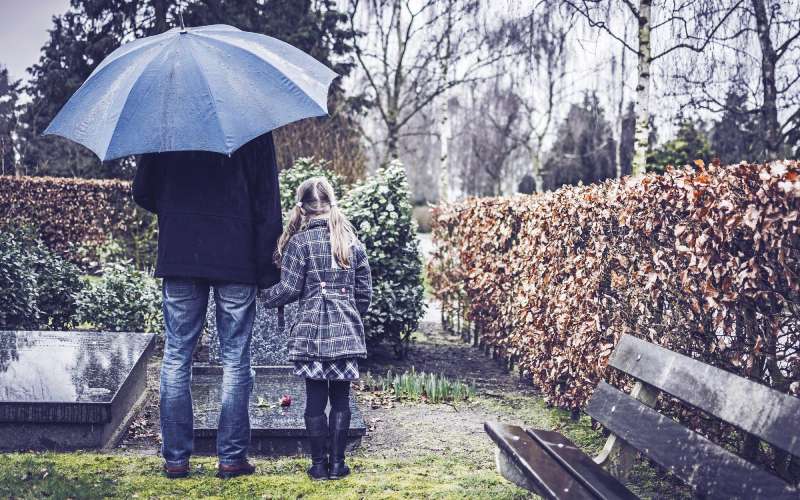Attending Funeral Services: Your Funeral Etiquette Questions Answered
Attending funeral services can raise a host of questions. The first question that will come up is, should you attend the funeral? Unless the obituary says it’s a private service, then you can assume the public is welcome, and you should go.
Until you’ve lost a family member yourself, you won’t understand what a comfort it is to the family to see “a full church [and] the pews packed with people who also care for and remember the deceased. … The family knows that attending a funeral is inconvenient, and that’s why they’ll never forget that you came.” (from The Art of Manliness)
Funerals today range from the rigidly ritualistic to the extremely informal. Don’t let fear of the unknown keep you from attending funeral services. Even if the services are for someone of another faith, your presence is appreciated. The funeral director or clergy will tell the mourners what to do and when if necessary. (For a glimpse of the differences, see Funeral Customs.)
Attending Funeral Services: Arrive early.
- Services often are delayed because of the people who show up five minutes before the starting time and find they have to park a block away and then try to find a seat, perhaps after the service has already started.
- If there is a registry or guestbook, be sure to sign it with your first and last names and, if appropriate, your relationship to the deceased (“co-worker,” “friend,” “colleague,” “college roommate”). It is important to the family to see who attended the service, and they may use the registry to send thank-you notes.
- Don’t try to seek out the family before the service; if you find that they are greeting people, keep your interaction brief and find your seat quickly. Sit toward the front only if you are a member of the family; close friends generally sit behind the family, while those who are co-workers or acquaintances sit further back or in the rear.
Attending Funeral Services: Be respectful.
- Don’t chat with those around you or eat or drink anything.
- Turn off your cell phone. Resist the temptation to check your text messages. Unless you have a dire emergency, stay for the entire service.
- If you bring small children who start making noise or causing a distraction, take them outside immediately.
- Tears are normal at a funeral; however, if you find yourself crying uncontrollably in a manner that would upset others or call undue attention to yourself, it is best to excuse yourself from the service until you can gain control.
- An open microphone for sharing memories of the deceased is sometimes available at memorial services. If you decide to participate, keep your remarks respectful and brief. Long-winded or off-color stories are inappropriate.
- Whether or not you agree with the rituals at a religious service, try to go along to the best of your ability. Your cooperation shows respect for the deceased and the bereaved family rather than agreement with the religion.
- If the funeral is an open casket service, there often will be an opportunity to file past the casket at the end of the service. If this is something you don’t feel you can do, you may gracefully and unobtrusively slip out.
Attending Funeral Services: Photography.
There are very few reasons for taking pictures when attending funeral services. In some religious traditions, any type of recording device is forbidden at a funeral (see Funeral Customs). Even if custom doesn’t forbid photography, taking photos can be seen as an invasion of privacy.
- If the family has specifically requested you to photograph the service—perhaps because certain family members couldn’t attend—do so with the utmost discretion, using natural light if possible rather than a flash and avoiding close-up photos of grieving people.
- Etiquette demands extreme respect for others; remember this tenet when taking photos. Be particularly aware of what is in your background when taking photos. It is easy to catch a mourner in a moment they would not like to have published.
- Unless the family has asked you to do so, photographing the deceased in the casket is generally considered in very poor taste.
Attending Funeral Services: Visitations.
If you were close to the deceased or the family, it is customary to visit the family upon learning of the death.
- This visit may be at the family home, funeral home, or another designated place chosen by the family.
- If you knew the deceased but not the family, introduce yourself by first and last name and let them know your relationship with their loved one: “I am Heather Jones, and I worked closely with Suzanne at XYZ. She was a dear friend and colleague. I am so sorry.”
- If visiting the funeral home, take a moment to stand by the casket (if it is present) to pay your respects, whether you offer a silent prayer or simply reflect. Greet the family before or after you pause at the casket, depending on whether the family is occupied when you arrive.
- Be sure to sign the guestbook or registry if one is available.
- A formal, scheduled visitation period may include a prayer or a brief service; leaving in the middle of it is impolite.
- Bringing a card with a personal note and flowers or a basket garden is appropriate. However, flowers are not customary for all religious beliefs and ethnicities (see Funeral Customs). Flowers should always be in a vase to relieve the family’s difficulty locating one.
- If visiting the family’s home, you may want to take a re-heatable casserole or other dish. It’s wise to call first to see whether such help is desired. Close friends of the family may offer to take on some household chores. If your visit comes when many others are visiting, see if you can serve coffee or help in other behind-the-scenes ways to make the family available to receive callers.
- Keep your visit brief unless you are lending a hand or are encouraged by the family to stay longer. After you have expressed your heartfelt sympathy, asked if you can help meaningfully, and perhaps offered a warm memory or two, leave. This is not the time to “hang out,” talk about your own bereavement, or catch up on old times.
Attending Funeral Services: Wake.
- A wake is similar to a visitation and can be a celebration of life, complete with singing, libations, and laughter as mourners share their memories of the departed. When you arrive, it’s proper to go directly to the family to offer your condolences before joining the other mourners.
- Remember, even though there may be a party atmosphere, the primary purpose of a wake is to comfort the bereaved and remember their loved ones.
Attending Funerals: Questions and Answers.
Be as respectful toward an urn as you would be toward a casket bearing the remains of your loved one. Make sure that your children also understand the importance of showing respect. As tempting as it may be for them to want to hold it to see how heavy it is, look inside, or shake it, this is not appropriate.
Ask yourself whether your child attending funeral services will be disruptive during this solemn occasion (crying, fussing, talking, wiggling, or unable to sit still). Children who are very young and can’t understand what is going on generally should not attend services. Not only may they disrupt the service, but the grief displayed may be upsetting to them. It may be appropriate to take older children who knew the deceased and have at least a basic understanding of the service.
Children old enough to understand death also should understand the purpose of a funeral and be allowed to ask questions before or after the service and to work through their grief.
If they will be attending the service, they should be told what to expect so they can be prepared. This is especially important if there will be an open casket. Addressing questions in advance also helps prevent spontaneous and potentially embarrassing questions during the funeral.
Recognize that children, like adults, may respond to grief with humor, behavioral issues, and sleep problems. Be patient and tolerant.
For many people, wearing black while attending funeral services is a symbol of grieving and sympathy. Although people are less sensitive about dress today, one still shows respect for the family by dressing in subdued colors and clothing that is conservative—that is, clothes that don’t call attention to yourself by being too casual, loud, or revealing. Some colors and styles are culturally inappropriate for certain traditions, so if you are attending a service of another faith or ethnicity—one with which you are unfamiliar—see How to Dress for a Funeral for more information.
Don’t feel guilty about saying or doing something when attending funeral services that causes a loved one to cry or if you cry.
Crying is healthy. If, however, you find yourself weeping uncontrollably (you’re causing a scene or making other mourners uncomfortable), it is polite to excuse yourself until you regain control.
The cardinal rule is to ensure the focus is on the survivors, not on you and your grief. You are there to console the family, so don’t put them in the awkward position of consoling you.
Whether or not to attend the service honoring the passing of an ex-wife or ex-husband (or a member of their family) can be a difficult decision.
If your relationship with the family is cordial and you wish to pay your respects, by all means, attend the service.
If you know or feel that your presence will upset the family of the deceased, or they might have a difficult time putting hard feelings aside, it’s kinder to simply send a note or flowers.
If you do attend, don’t call attention to yourself or compete with the family for attention.
Avoid saying anything derogatory, demeaning, or mean-spirited about the deceased, even if what you are tempted to say is a fact.
Rise above your feelings or history to encourage and uplift the survivors who loved and cared about your ex.
The etiquette for driving in a funeral procession is fairly simple: follow the instructions of the funeral director (if applicable), turn on your headlights, and closely follow the vehicle ahead of you. Funeral processions generally have the right of way at intersections, and other vehicles should yield. Refer to Funeral Processions for more information.
There may be a public graveside service for interment or inurnment after the funeral. If the cemetery is distant from the funeral, there likely will be a motorcade or procession.
When you arrive at the cemetery, pull off to the side but don’t park on the grass unless directed to do so.
Keep in mind that the chairs at graveside are for the immediate family members (or the infirm); others will be expected to stand.
If you’re male, remove your hat during the service.
It is not polite to laugh loudly in a cemetery, engage in cell phone conversations during the service, or sit, walk, or lean on gravestones or markers.
Keep your children in check and remind them that this isn’t the park; games of tag or catch are inappropriate.
Avoid walking directly on graves if you can (stay between the headstones).
Clothing choice for a graveside service is the same as for a funeral service: conservative is best. This isn’t the place to make a flashy fashion statement or show up in gym clothes.
It is not appropriate to take photos during a graveside service unless you have a legitimate reason for recording the event. Photography should be done only with the permission of the family.
As kind as your intentions may be, a general offer of “If you need anything, call me,” usually isn’t helpful. The grieving family is often hesitant to take up general offers because they feel they may be imposing.
If you wish to help the family of the deceased in some manner, it’s best to make a specific offer, e.g., “Would you like me to go with you to the funeral home?” “I would love to provide child care during the service,” “I can serve coffee while you’re receiving visitors,” “I’d be happy to sit with you and answer your phone for a while,” or “Next time your car needs an oil change, call me and I will come do it for you.”
Friends often bring food to the bereaved family, and while this practice can be extremely helpful, it also can be a burden. You may wish to call first to find out whether food is needed; if the family’s fridge and freezer already are overflowing, you may want to wait a few days.
Help in the form of financial assistance must be done discreetly. Even if the family is in dire straits financially, it may be a matter of pride to keep that situation confidential, and cash donations can be embarrassing. In some circumstances, there will be a public account set up at a bank in the name of the deceased, or you may be able to provide a donation anonymously with the help of the family’s priest, rabbi, or pastor. It is generally inappropriate to approach the family and offer cash directly.
If you are asked by the family to be a pallbearer, consider it an honor. You should accept unless you have physical limitations that would keep you from helping to lift and carry the casket. If you must decline, do so with regret, and explain why.
The funeral director will inform you of your duties at the funeral and, if applicable, at the graveside. Pallbearers usually carry (or, in the case of honorary pallbearers, accompany) the casket to the front of the church or funeral home, to the hearse, and from the hearse to the burial site.
Contributor: Jenny Mertes







